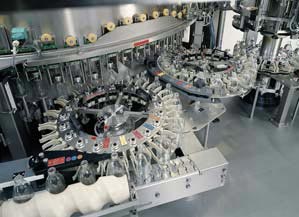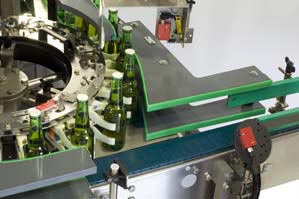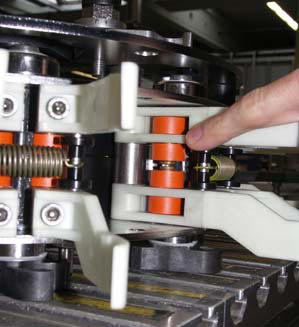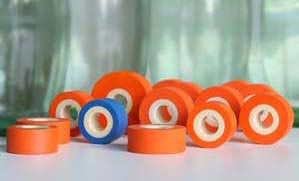Special solution increases service lives
New two-component polymer bearing for star wheels in drinks bottling equipmentThe demand for packed drinks is increasing. To ensure the fast and reliable handling of different sized glass and PET bottles, so-called star wheels play a major role in complex drinks bottling equipment. They are exposed to very large loads, particularly in the high-performance range. Their service lives have almost been doubled since they have been equipped with two-component plastic rollers.
“Brewery, filtration, bottling, logistics – we not only equip complete breweries, we are at home in the beverages branch all over the world,” says Jürgen Stemmer, Group Manager for Labelling Technology, Container Sets and Special Star Wheels at Krones AG, Neutraubling/Germany, one of the world’s leading suppliers of drinks bottling equipment and packaging technology. “The demand for complete solutions is increasing. We serve our customers’ complete value creation chain, from drinks production to goods distribution. “ Krones plans, develops and manufactures machines and complete lines for the fields of process technology, bottling and packaging, as well as intralogistics. Every day, millions of bottles, cans and specially-shaped containers are “processed” on lines from Krones; particularly in breweries, the soft-drinks sector and at still-wine, sparkling-wine and spirits producers, but also in the food and luxury goods sectors, as well as in the chemical, pharmaceutical and cosmetic industries.

The star wheel at Krones AG, Neutraubling, can grip glass and PET bottles of sizes differing by up to 20 mm without any problems. In a carousel, the bottles are transported to downstream machines at high speed.
Since being founded in 1951, Krones has evolved far beyond its original role as a mere producer of machinery and bottling lines. The company has become an “all-round partner” for its customers. creating harmonious, optimised synergies of mechanical engineering, line-related know-how, process technology, microbiology and information technology. Today, Krones is synonymous for “systems engineering”.

There are eight lubricant and maintenance-free rollers, in each clamping unit – here is one for inspection technology. There is a PEEK rotating axis between the units which – triggered by a cam follower – ensures that the clamp opens and closes.
Krones is a global player in this sector. “Our machines and lines offer customers economic added value all over the world,” says Jürgen Steimmer “Our aim is to find the suitable solution for every requirement.” Example: Inspection, filling and labelling technology for glass and PET bottles. Here, so-called star wheels prove their capability. They are mainly used for inspection technology. In a carousel, the bottles are transported past cameras at high speed. These cameras not only check the state and type of the individual bottles, they also detect whether they contain any soiling such as straws or cigarette stubs. Then the bottles are passed on to other areas, for example to the labelling section, via a star wheel. Such star wheels are available in four different star diameters.
are interesting e.g. for lines in large breweries or mineral water filling plates that have to handle many different bottle sizes. Since a star wheel compensates a diameter tolerance of 20 mm, one star wheel is not required for each individual bottle size. This means they do not have to be exchanged, thus saving filling plants set-up time and costs. “The wheels are in permanent use in the machines. Before, their service lives were limited,” says Jürgen Steimmer. “Which is why we had to urgently remedy the situation.” “

The new two-component bearing developed for Krones, is a variant comprising a polymer bearing and roller. It guarantees smooth and wear-free movements on the expensive PEEK rotating axis.
To prepare a solution for the star whell in order to significantly lenghten its service life it was worked together. In addition, two-component rollers have been used in the spring clips for around two years now. The polymer material “iglidur J” was chosen for the inner bearing. This material has been proving its worth for years in all kinds of industrial packaging and filling applications. This new two-component version proved to be the ideal solution for Krones’ requirements.It minimises wear and guarantees even longer machine running times. Depending on the diameter, a star wheel can be made up of four, eight, twelve, eighteen or even 24 parts. is a PEEK rotating axis between the clamping units which – triggered by a cam follower – ensures that the clamp opens and closes. . “The rollers in particular used to get worn very quickly, which meant customers had to overhaul their star wheels relatively often,” Jürgen Steimmer reports. Their bottling lines were then at a standstill, the number of complaints increased. Quite often, customers had a second star wheel on hand for quick replacement in an emergency. This cost more, of course, and no-one wanted to pay these extra costs. “Something had to be done urgently. And now, we have eliminated this weakness. “
Star wheels are under a heavy load in their day-to-day use in breweries. In large high-capacity breweries, up to 66,000 bottles pass along the lines per hour, which means there are 66,000 opening and closing processes per hour as well. To increase the service life of the rollers, numerous tests were carried out with a series of materials. “We had contacted different plastic suppliers at first,” remembers Jürgen Steimmer. “But the results were not satisfactory. Either the rollers wore even more quickly, or the rotating axis did. It was only when we decided to work with igus® that we gradually arrived at a solution to the problem. ” Bernhard Hofstetter, the technical sales consultant responsible at igus, continues: “At that time, Krones knew us as a specialist for plastic bearings, but not for rollers. This application was a great chance for us to highlight other aspects of our portfolio. “
Following comprehensive tests, Krones was presented a variant comprising a polymer bearing and roller. First tests with rollers made of “iglidur® J” material initially indicated that the difference in friction coefficient between inside and out was not large enough to guarantee wear-free movements on the expensive PEEK rotating axis permanently. It was only the new two-component variant with a good friction coefficient on the inside and a poor friction coefficient on the outside that brought results. The “iglidur® J” inner bearing with outer sheath made of TPU rotates very smoothly and without wear on the axis, ensuring smooth operation. “We no longer get any complaints at all,” Jürgen Steimmer confirms. “The service life has been significantly extended.” “

The inner bearing is made of the tribo-optimised polymer material “iglidur® J”, the outer sheath is made of TPU. Formerly orange, it is now blue with RoHS approval.
The two-component bearing was tested for almost a year before it was installed in the first Krones lines. Whereas the colour orange was chosen first for the TPU outer sheath, this is now delivered in the company’s blue colour. “We were able to kill two birds with one stone in this case,” Jürgen Steimmer explains. “Firstly, blue matches our machines better, and secondly, the blue dye has RoHS approval, which is why these rollers have now been being installed since summer 2009. .” The tribo-optimised plastic rollers are supplied in six different sizes. This is related to the size of the bottles and thus the clamps’ opening angle. The rollers are available for bottle diameters from 50 mm to 110 mm. “The opening angle for a 3 litre Cola bottle, for example, which is a standard size on the American market, has to be large enough for effective handling,” Steimmer explains. On account of their size and weight, these bottling lines can “only” handle 20,000 bottles an hour using the multi-purpose star wheel.